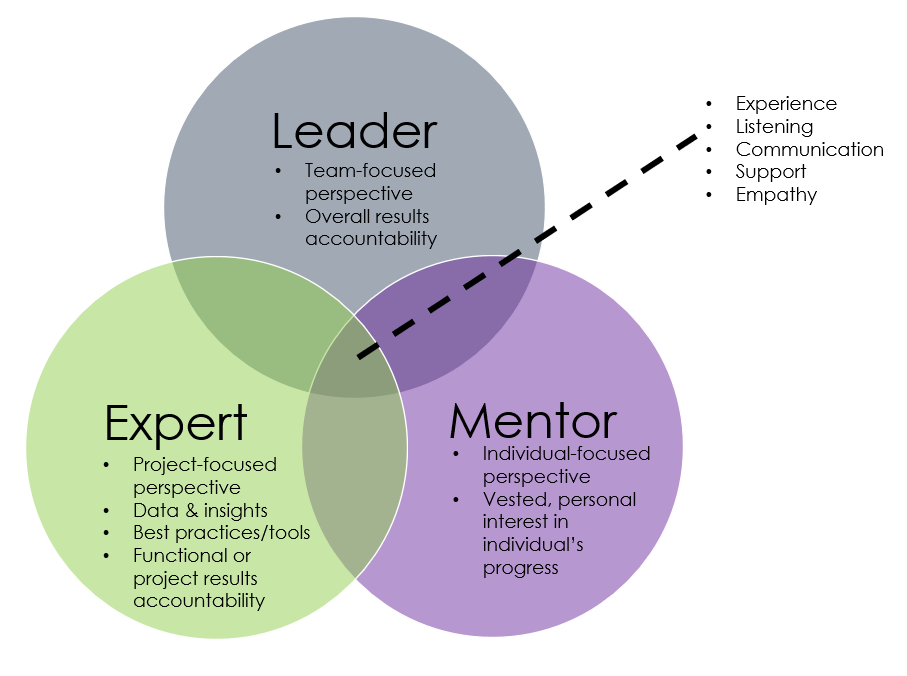
This blog series addresses some common misconceptions about consulting and executive coaching. Visit the CommsLede blog or my LinkedIn page for more…
Misconception 8: I’m a seasoned leader/pro/mentor … coaching will be a breeze.
Imagine a pretty Venn diagram with three overlapping circles: leader, mentor and subject-matter expert. At the intersection of these roles, you’ll find important traits like experience, listening, communication, support, and empathy. Inside each circle, you’ll also find individual characteristics:
- Leaders tend to have a team/organizational perspective and are accountable for delivering overall results.
- Experts tend to be strategy or subject-matter-focused, and are often accountable for establishing best practices and deliverables, interpreting data and insights and making recommendations.
- Mentors tend to focus on the individual, and often have a personal, vested interest in the mentee’s growth and development.

The distinction between these roles is important because lately, several folks have shared with me their desire to become executive coaches, assuming that if they’re seasoned leaders, pros, or mentors, they’ll easily transition to formal coaching roles.
I, too, assumed learning to be an executive coach would be a breeze. I had previously led, mentored, and consulted in corporate and non-profit environments. I had also taught in academic settings and facilitated corporate workshops. I was a communications pro with deep listening, support and empathy skills. “Piece of cake!” I imagined.
My first week in coaching school quickly (and oh-so-humbly!) relieved me of that assumption.
- My corporate strengths – interpreting data, finding solutions, having a bias for action, influencing leaders and leading teams, and quickly driving for results – didn’t apply in an executive coaching scenario.
- My teaching skills – guiding students to a “correct” (or, at minimum, “acceptable”) answer and evaluating their responses – downright conflicted with executive coaching.
- Advising skills I learned as a consultant – assuming a client’s headaches, owning the process, offering a recommended course of action and bearing full responsibility for the outcome/results – were definitely not relevant.
This was a BRUTAL wake-up call.
In fact, I vividly remember feeling sick to my stomach sitting in my first week of coaching class, regretting I spent so much money on tuition. Why did I think I could coach others? Almost none of my existing skills applied.
I froze in early coaching simulations, crashed and burned in my first several peer practices, and avoided early class discussions completely. Eventually, I tossed my mentoring, consulting and leader mindsets out the window, and class became significantly easier. Things started to make sense.
The Importance of “Unlearning”
Reflecting on my coaching school experience, I initially found it a challenge because it involved “unlearning” or “suspending” most of my day-to-day business skills, and starting from scratch. I learned how to:
- Hold space, instead of filling it with answers, recommendations, or advice
- Listen, without evaluating, guiding, or judging
- Embrace curiosity, instead of following my own professional instinct or a standard process
- Let the client lead the conversation, versus taking ownership and responsibility
- Be okay with the outcome, wherever it led
Surprisingly, one of the most significant takeaways I had from coaching school was that strong leaders, experts and mentors have the potential to be great coaches … but the transition can be rocky. To fondly quote coach Ted Lasso, “Taking on a challenge is a lot like riding a horse, isn’t it? If you’re comfortable while you’re doing it, you’re probably doing it wrong.”
Similar to growing in other roles, learning to effectively coach others requires openness, vulnerability, humility, a whole lot of discomfort, awkwardness, and experimentation, and a genuine willingness to learn a new set of skills.
While transitioning to a formal, trained coach role may not actually be “a breeze” for most seasoned pros, if you’re open to a new mindset and lots of unlearning, coaching might be a path to consider.
With more than two decades of communications experience spanning agencies, Fortune-100 organizations, non-profits and academia, Kristi Hinck Mills brings her passion for communications to CommsLede Consulting, where she delivers strategic solutions and executive coaching for her clients. Visit the CommsLede blog for more tips.



